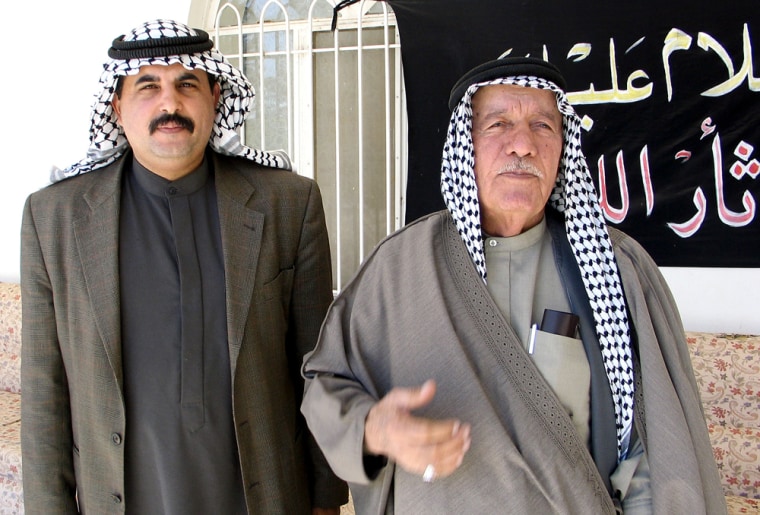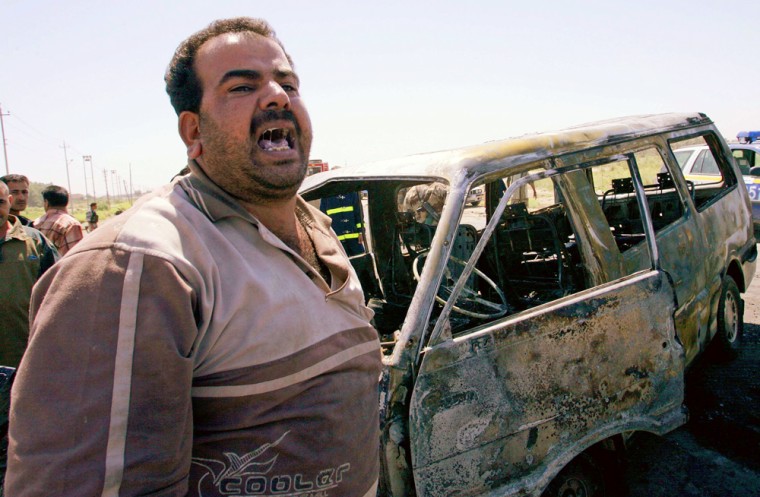A suicide car bomber killed an influential Shiite member of parliament and his son as they drove from their farm to the capital Tuesday, an attack likely to stoke ethnic tensions on the first anniversary of the transfer of sovereignty to the Iraqis.
The attack that killed Dhari Ali al-Fayadh, his son and two bodyguards was one of several around the country carried out by suicide bombers.
Another killed a U.S. soldier in Balad, 50 miles north of Baghdad. At least 1,742 members of the U.S. military have died since the war began in 2003, according to an Associated Press count.
A car bomb north of Baghdad killed five people and injured nine others, police said. The explosion occurred about 15 yards from the headquarters of an Iraqi quick-reaction police force in Baqouba, 35 miles northeast of the capital, police Capt. Nihad Jamal Ibrahim said.
Two other car bombs in Baqouba caused no injuries, police said.
Near Musayyib, 40 miles south of Baghdad, a bomber wearing a belt of explosives blew himself up at a checkpoint, killing one policeman and wounding 17, police said.
In Kirkuk, a suicide car bomber slammed into a convoy carrying traffic police chief Brig. Gen. Salar Ahmed, killing one of his bodyguards and a civilian, said police Lt. Assad Mohammed. Four others, including Ahmed and three of his bodyguards, were wounded in the city 180 miles north of Baghdad.
‘Operation Sword’
The attacks came as more than 1,000 U.S. troops and Iraqi forces launched “Operation Sword” in a bid to crush insurgents and foreign fighters in western Iraq — the third major offensive in the area in recent weeks. A U.S. reconnaissance helicopter was hit Monday night by small-arms fire in Tal Afar, about 95 miles east of the Syrian border, and forced to land, but there were no reports of injuries, said Sgt. John Franzen, a spokesman.
The military campaigns have not been able to capsize a resilient insurgency that has killed more than 1,350 people — mostly civilians and Iraqi security forces — since Prime Minister Ibrahim al-Jaafari announced his Shiite-dominated government on April 28.
Al-Fayadh, who was in his late 80s, was killed while traveling to parliament from his farm in Rashidiya, 20 miles northeast of Baghdad, said parliamentarian Hummam Hammoudi, who heads a committee charged with drafting a new constitution.
The blast also wounded four people, police Maj. Falah al-Mihamadawi said.

The group al-Qaida in Iraq claimed responsibility for the assassination on an Islamic Web site, saying a “suicide car bomber, in a heroic attack, exploded himself at the motorcade of the assembly member, his guards and his companions.” The authenticity of the statement could not be verified.
Al-Fayadh was the eldest member of the new parliament, and he was the interim speaker until one was elected. He was a member of the country’s largest Shiite political party, the Supreme Council of the Islamic Revolution in Iraq.
Al-Fayadh also was a senior sheik from the al-Boamer tribe in the Mahmoudiya area, about 20 miles south of Baghdad and a hotbed of the Sunni-dominated insurgency. Al-Boamer includes both Sunni and Shiite clans.
“Those who killed the sheik are the enemies of the Iraqi people at large,” Hammoudi said.
Al-Fayadh was the second Shiite legislator to be killed since the parliament started work in March. Lamia Abed Khadouri al-Sagri, a member of the Iraqi List party, was killed April 27 in eastern Baghdad.
Al-Fayadh’s seat will be taken by the runner-up from the same party.
The country’s Shiites already are on edge following a series of car bombings last week that killed nearly 40 people in predominantly Shiite neighborhoods in Baghdad. With the Sunni Arab-dominated insurgency targeting the Shiite majority, the wave of killings has raised fears of civil war.
Volatile Anbar province
The new U.S.-led military campaign is focusing on communities along the Euphrates River between the towns of Hit and Haditha in the volatile Anbar province, said Marine Capt. Jeffrey Pool, a spokesman. The U.S. troops include Marines, soldiers and sailors from Regimental Combat Team 2, which is part of the 2nd Marine Division.
The region, about 125 miles northwest of Baghdad, is rife with insurgents. Operation Sword, or “Saif” in Arabic, comes on the heels of two other offensives: operations Spear and Dagger.
Operation Spear was aimed at stemming the flow of foreign fighters over the porous Syrian border in Karabilah, near the Iraqi frontier town of Qaim. The U.S. military said nearly 50 insurgents were killed in the five-day operation.
A senior al-Qaida leader wanted in Saudi Arabia was killed in the offensive, al-Qaida in Iraq’s leader, Abu Musab al-Zarqawi, said in an Internet posting whose authenticity could not be verified.
Operation Dagger, which was carried out north of Baghdad, was aimed at uprooting networks of foreign fighters.
The U.S.-led coalition has carried out other offensive and raids in recent months, detaining hundreds of suspected insurgents. Consequently, the U.S. military said Monday it was expanding its overcrowded prisons across Iraq to hold as many as 16,000 detainees.
Meanwhile, Syria has increased the flow of water down the Euphrates to boost Iraq’s power generation, the government in Damascus said in comments published Tuesday.
The move was a gesture of solidarity with the Iraqis who are passing through “very delicate circumstances,” Irrigation Minister Nader al-Buni said, according to the official newspaper Al-Thawra.
Al-Buni said that from the middle of this month, Syria had been supplying Iraq with water flowing at 23,658 cubic feet per second. He did not give the normal flow.
